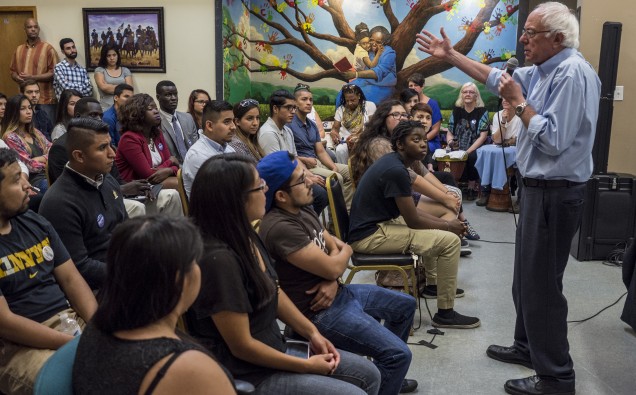
A wave of disaffection against economic disparity and income inequality carried Tuesday’s contests for presidential nomination race, helping Democrat Bernie Sanders to pull off a stunning win in Michigan and cementing Donald Trump’s position as the Republican frontrunner with three more state victories.
The defeat in Michigan – a politically important state – overshadowed Democratic frontrunner Hillary Clinton’s blowout in Mississippi and raises fresh concerns for the former Secretary of State with regard to building a momentum on her March 1 Super Tuesday wins into the next week’s contests in vital states including Florida, Ohio and Illinois. The other two states to vote March 15 are Missouri and North Carolina.
“We believe that our strongest areas are yet to happen,” Vermont Senator Bernie told an impromptu press conference after pocketing a bigger share of Michigan delegates, where he had been lagging behind Clinton in almost all polls and forecast. “What tonight means is that the Bernie Sanders campaign … is strong in every part of the country.”
Sanders scored big win among voters “very worried” about the U.S. economy and among those who blame international trade deals for job losses to Americans. The message resonated with people of Michigan, whose manufacturing base has taken devastating hits from global trade pacts that Clinton has overwhelmingly supported.
As a CNN exit poll showed, controversy surrounding her use of private email server for critical official correspondence continues to haunt Clinton. Sanders outperformed her 80% to 19% in a category of voters who said their most important priority in a presidential candidate is that they are honest and trustworthy.
The Michigan win will also give Sander’s campaign a big boost in making inroads among black voters he had been desperately trying to win to stake his claim of being equally popular within diverse electorate, and not just among white blue collar voters. The win will make him enter the arenas in states like Ohio, North Carolina, Illinois and Missouri slated for vote next week with more confidence.
Though by a thin margin of two percentage point, the unexpected loss mean Clinton should brace for a longer primary battle than she had earlier anticipated when she told her supporters at a Monday gathering that “the sooner I could become your nominee, the more I could begin to turn my attention to the Republicans”.
The Michigan debacle will also likely give Clinton a scare of happenings in a similar campaign some eight years ago when she was highly favored to win the nomination race for Oval Office against the then senator Barack Obama.
Of particular worry are the states in the industrial Midwest, like the Buckeye neighboring state of Ohio, where themes of jobs and economic losses due to trade deals sync with voters.
The overwhelming win in Mississippi takes Clinton’s tally to 13 states in this Democratic primary contest, including eight where black voters are a major force and are heavily tilted towards the former First Lady, a strong advocate for continuation in President Obama’s policies.
Sanders’ nine victories are mostly in small states, meaning that he significantly stays behind in the race for winning 2,383 delegates from the total 2,973. Support of super delegates – party officials and bearers – has put Clinton in a formidable lead with 1,221 as against Sanders’ 571. His campaign managers are confident of doing even better in states outside of the Deep South, which offer a level-playing field. Sanders’ unexpected strong showing among youngest black voters of Michigan is a surprise for Democrats.
On the Republican side, Trump claimed the night with big wins in Michigan, Mississippi primaries and the caucuses in Hawaii – a winning trail only scarred by a loss to Ted Cruz in Idaho. His wins came despite a huge negative ads campaign run against the billionaire real-estate tycoon by the GOP establishment which now seems in tatters to stem Trump’s ascendency toward clinching the nomination.
A visibly relaxed Trump vowed to steal voters from the Democrats and inflict a defeat on his Democratic rival he believes will be Clinton. “What we’re going to do is beat Hillary Clinton – and we’re going to beat her badly,” he said speaking from his golf club in Jupiter, Fla.
Both in Michigan and in Mississippi – a state that has support for his anti-immigration stance – Trump made inroads among voters who are angry and dissatisfied with Washington politics. His pitch on economic development and trade also drum well with the working-class in the Rust Belt – parts of northern and Midwestern U.S. which are characterized by declining industry and aging factories.
A win in Idaho would help Texan Senator Cruz to build on his argument on leading anti-Trump forces, that he is the only alternative to Trump. His performance was supported by a dismal performance by Florida Senator Marco Rubio and failure by Ohio Governor John Kasich to show substantial gains in Michigan.
Both Rubio and Kasich face a must-win situation in their home-states to have any moral reasons to stay in the GOP nomination race for the Presidential election slated for November 8 this year.














